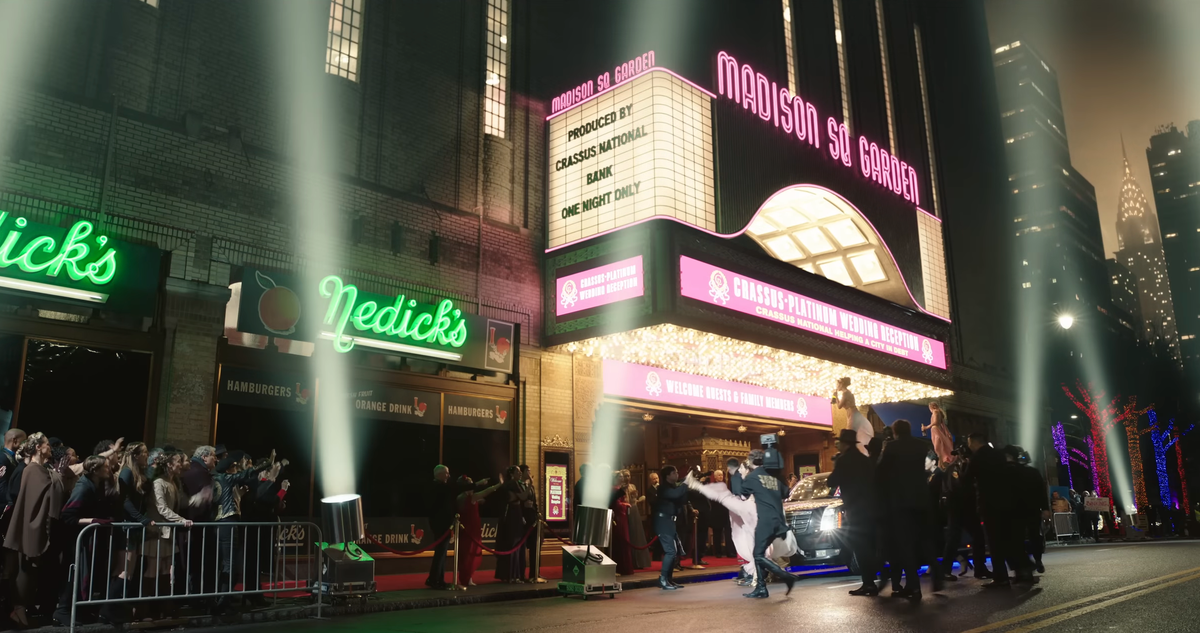The moment when an actual live human walked out in front of the movie screen to pose Adam Driver’s Cesar Catilina a question (which Cesar, in the film, proceeded to answer) might, in retrospect, be one of the less bizarre moments in Francis Ford Coppola’s Megalopolis. The director’s supreme dream project, which he’s been trying to get off the ground for four decades, arrives at Cannes trailing clouds of speculation, skepticism, and controversy. It bears the marks of all the years Coppola has spent trying to make it, with elements that feel like they’ve been patched in from different periods in his filmography: a bit of The Godfather here, a bit of Tucker: the Man and His Dream there. But the movie also feels older than that. Watching it, you sense the imagination of someone who came of age in the 1950s, with its visions of scientific progress, innovative design, and space-age wonder. How odd and curiously apropos that when we do see glimpses of Coppola’s city of the future in this 2024 film, it doesn’t seem too far from something we might have seen on The Jetsons. Megalopolis comes to us as the (perhaps final) testament of an artist now in his 80s, but sometimes it feels like the fevered thoughts of a precocious child, driven and dazzled and maybe a little lost in all the possibilities of the world before him.
There is nothing in Megalopolis that feels like something out of a “normal” movie. It has its own logic and cadence and vernacular. The characters speak in archaic phrases and words, mixing shards of Shakespeare, Ovid, and at one point straight-up Latin. Some characters speak in rhyme, others just in high-minded prose that feels like maybe it should be in verse. At one point, Adam Driver does the entire “To be or not to be” soliloquy from Hamlet. Why? I’m not exactly sure. But it sure sounds good.
…
Megalopolis is filled with quotations and lines that feel like quotations. Among the aphorisms that drift in is one attributed to Marcus Aurelius: “The object of life is not to be on the side of the majority, but to escape finding oneself in the ranks of the insane.” Interestingly, the quote does not appear anywhere in Marcus Aurelius; apparently, Leo Tolstoy once cited it as coming from the Stoic Roman Emperor, and everybody just accepted that as fact. So, it’s a fake quote! But a beautiful one nonetheless, presumably warning against the dangers of going with the crowd but also of the dangers of going mad in one’s opposition to the crowd. But hearing it in this film, I imagined an extra comma in there, between escape and finding: “The object of life is not to be on the side of the majority, but to escape, finding oneself in the ranks of the insane.”
It totally reverses the meaning, but it would be in keeping not just with this movie but Coppola’s career in general. Over and over again, he very consciously leaps over the edge with each new project. He admitted to going insane making Apocalypse Now. I’ve written elsewhere that I thought he’d lost his mind with Bram Stoker’s Dracula, a movie I now consider a masterpiece. Surely the man who staked his entire studio on One From the Heart — the beautiful, woozy, unforgettable, financially dead-on-arrival One From the Heart — wasn’t thinking clearly. And so, he’s done it again, and perhaps exceeded himself. Megalopolis might be the craziest thing I’ve ever seen. And I’d be lying if I said I didn’t enjoy every single batshit second of it.



Well, this sound’s refreshing.